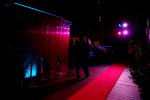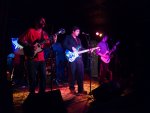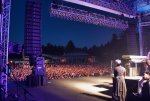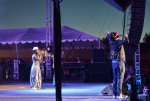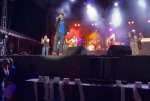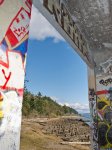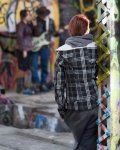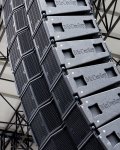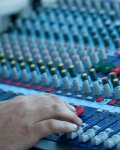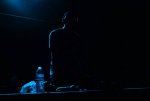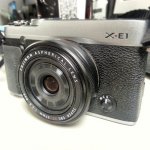Re: Looking for a simple camera for gig photos
Thanks for the replies.
I'd love a Canon 5D, but if I could afford one I wouldn't be giving it out to random crew to play with. :razz:
I have a Sony Alpha A300 SLR, and whilst I can get reasonable results on that, it's only after a lot of playing with exposure and ISO. For a quick shot, where there's only one chance to get it, I'd manage something better on my iPhone than with the SLR almost every time. Auto mode on the Alpha seems to give dark very underexposed results and I'm hamfisted enough with the manual controls that it takes a great deal of trial and error to get anything worthwhile.
I'm not expecting miracles from a small relatively cheap camera but surely there must be improvements in image quality to be had from a lens and sensor which, although nowhere the size of an SLR, is many times bigger than an iPhones. (Plus an iPhone 5 over here is ~£600 depending on spec. The camera will be a small fraction of that price. Surely if I spent ~£200 on a point and shoot camera that would cover a better camera than is squeezed into the iPhone?)
It's not that everything we take is useless - I've had a number of great shots from the iPhone, but they've been flukes. I was figuring that with crew running around with a small camera, maybe 95% of what they take will be useless, but there will be some gems in amongst the dross. Or is that an unrealistic expectation?
I do have a couple of photographers I could call on. The problem with gigs (and outdoor gigs in particular) is that there's a lot of time and travel involved so the "cost per useful shot" is very high. Also we are weather dependent, there's no point in having a proper photographer come out if it is bucketing with rain and everything looks miserable.
The tripod is a good tip, a lot of the blurring we get (on faces, in particular) could probably be eliminated this way.
Stuart,
You're singing my song! (see previous post)
Stage lighting is difficult, at best and it will indeed need "...playing a lot with exposure and ISO"
And I did say shooting with an advanced camera may not produce better results - more "suck" knobs. In many cases, the IPhone may produce better pics, and more consistently.
If the Alpha consistently underexposes in "auto" mode, the underexposure problem MAY be able to be fixed via the exposure compensation - if it is available in "auto" mode. With Canon, there is "auto" mode and "Program" mode - the latter has the option of applying exposure compensation. This is something you can read about in the manual and do RIGHT NOW.
Your quality problem is not sensor size - and nearly every P&S has a slow lens and a very small sensor anyway. See link for sensor size comparisons.
Image sensor format - Wikipedia, the free encyclopedia.
Your problem is light. Concerts do not have enough. Fixes are lens speed - which relates directly with shutter speed - and shutter speed is what you need to prevent blurring - or add a ton more lights. Higher ISO will also be a direct relation to shutter speed, but higher ISO means more "grain" - less good looking image.
You speak of getting great shots that are flukes - Unless you have the SKILL and the TIME to dedicate to the photo, all your shots, regardless of camera, will be flukes. Yes, as a distracted amateur, your expectations are VERY unrealistic. Consider a working photojournalist back in film days - in decent light, they were happy with one good one in 20 - call it two a roll. Now with 8fps, the number of keepers per hundred shots is MUCH lower than film. Memory is cheap. Deleted photos go in the bit bucket, and the bit bucket NEVER fills up.
There is a cost to quality. Sound, photo, everything.
I wrote something for a photo blog post a couple years ago concerning how to shoot concert pictures.
Quite long - but lots of truths and suggestions.
==============================================================
Determine your own tolerance for image noise - at which ISO does noise become unacceptable, or rather, what ISO can you stand. Of course, that is dependent on your personal taste, and your post-processing drill - whether you use something like Neat Image or Noise Ninja, for example.
Set your camera to the highest ISO you can stand. That will give you the most latitude in aperture and shutter speed.
Shoot RAW. That will allow you to make the most adjustments to color balance, and if need be, exposure after-the-fact. Stage lighting is neither "normal" nor consistent in color or intensity. Any type of white balance shooting, in my opinion, is fruitless. In post processing, set the scene to what you remember the best. If you attempt to neutralize skin tones, or to 18% grey, the scene will start looking very odd, indeed.
The dynamic range on stage is often higher than the camera can capture. RAW will also give you the best highlight and shadow recovery, if needed.
Most of the time, I find myself shooting wide open, or nearly so, just to keep the shutter speed up. If your lenses can stand it, shoot wide open - if not, find out where you find the lens to be acceptably sharp, combined with enough DOF for the shot you envision.
So that means, shooting in Aperture Priority mode - and let the shutter speed fall where it may. Watch it in the viewfinder -
Imagine your shot, and crop in-camera as close to that vision as you dare. Any after-the-fact cropping will just increase noise.
Know your composition. Anticipate. If your plan is to take a shot, and crop it later into something wonderful, it ain't going to happen. (none of us here on FM do that, do we? ) Plan your shot, and execute. Timing is critical.
Know what is important in the shot - and make sure that is exposed as well as you can. Blown-out details are a no-no. But don't be too conservative, either - lightening the photo in post - even RAW - will dramatically increase noise. Reading the histogram is tricky - lights and specular highlights will seem to indicate a lot of overexposure. Fakery, fakery, fakery! Same thing - there is so much black - non-detail black, the histogram will be climbing the left side. Don't worry too much. The histogram will look like a big smile with one tooth on the bottom - that "tooth" is probably your subject exposure - look at that. Expose for that and then...
Chimp early and often. That is, look at the LCD often to judge exposure of the picture. A learned skill, and tricky because of where the LCD brightness is set. Practice, Practice, Practice.
Again, crop in the viewfinder as close as you dare. The less black background, and the less bright light, the more reliable (or should I say readable) the histogram becomes.
If you choose to spot meter, know EXACTLY how that works, or you will be even farther off than if you use Evaluative and exposure compensation.
If you possibly can, use a tripod, or at least a monopod. Shutter speeds are usually quite borderline.
Expect a lot of throw-aways - shaking, subject moving, microphone in the face, shadows, bad expression, whatever. Experience is key - shoot as many gigs as you can - critically evaluate what went wrong, what was right - make a mental note of what to avoid, and what that you did right. Do more of the latter.
Now, if you can use flash, that is another thing all together. I'll let someone else handle that one...
Practice! Evaluate!
Let's first look at the "rule of thumb" for hand-holdability. That "rule" states that one can expect to handhold a shot at a given shutter speed that is related to the focal length of a lens. The recommended minimum shutter speed would be 1/focal length of the lens - so if you were shooting a 100 mm lens, the rule says one can hand hold at a shutter speed of 1/100 of a second, but not slower. If you were shooting a 28mm lens, the rule says you could use a shutter speed as slow as 1/30 of a second.
Most concerts are shot with some type of telephoto - somewhere between 85mm and 200mm. So according to the rule, you shouldn't be shooting any slower than 1/85 second for the one, and 1/200 second for the other. A long way from 1/8 second!
The rule of thumb is based on what we deem acceptable sharpness in a normal print - Take the print larger, and you will need a faster shutter speed. All is based on the "Circle of Confusion" (one of my favorite terms in photography!). Bob Askins has many articles on the subject of sharpness, and shutter speed - look up the terms on
www.bobaskins.com - great stuff there.
Even if you were to use a tripod, you may still experience blur at 1/8 second - but that could easily be your subject moving! One can handhold at lower speeds than the rule of thumb - it takes a very good technique for holding and bracing. The DSLR adds another thing one must overcome - the mirror slapping up and down - the type of motion that it is seen in pictures taken between 1/30 of a second down to about 1/2 second - (a tidbit to remember for macro photography, too) So not only are you shaking, your subject moving, and the camera is giving you the blues too.
So the last thing I'll address here, is there blur even with 1/500 second - first, are any shots sharp? How about during the day? Normal light? A lens is generally at its worst when wide open - it will have more visible defects, a more shallow depth-of-field that will put the autofocus to the test. Most lenses will be sharper when stopped down a stop or two - but that means the shutter needs to be open even longer to make up for the light lost due to the lens being stopped down. As the lens is stopped down, every lens will have greater depth-of-field, thus tolerating a less-than-perfect autofocus hit.
The key here is there are compromises - and low light, and active performers on stage, combined with telephoto needs make for a tough set. Find someone to help you with holding your camera - how to lock it in place. Practice, practice, practice. For some, available light is very tough - others find other types of photography tougher - i.e., wildlife, or birds on flight.
Just remember, your camera takes neither good or bad photographs - you do. Equipment can help some, but it is technique and practice that will be the difference between good and bad shots. An instrument does not make the musician - any more than a camera makes a photographer.
Final note - shooting RAW is just like shooting JPEG - the difference is in post processing - you may wish to lurk about that forum for a while - read a lot of the old posts there - a lot of your questions can be answered there - there is also a lot of PP using Photoshop and/or Lightroom on the web - time to sit down and read there, too.
good luck,
frank


